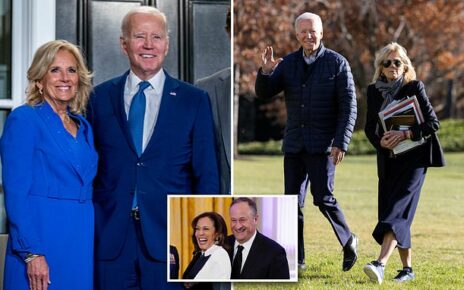Save articles for later
Add articles to your saved list and come back to them any time.
London: One of Europe’s top business figures in China says there is no hope that anyone can influence President Xi Jinping to retreat from his aggressive foreign policy.
Joerg Wuttke, the president emeritus of the EU Chamber in China, is in Australia to address the Asia Society on Monday about the economic trajectory of the world’s second-largest economy.
Joerg Wuttke is president emeritus of the EU Chamber in China.
He said its days of blockbuster economic growth were over because Xi was willing to exchange growth for ideology.
He said he did not believe this would lead to conflict over democratically ruled Taiwan, which China claims as its own and Xi has threatened to take control of, with military force if necessary.
Wuttke said that although Xi had to service his domestic crowd with patriotic statements, he would assess the risks and costs of starting a war as too great. Xi was “not a man in a hurry when it comes to Taiwan”.
“I really don’t see any military conflict in Taiwan, everything I hear here is too rational,” Wuttke said in an interview over Zoom from Beijing, where he has been based since 1997.
“He’s a man who doesn’t gamble. Unlike Putin, he’s a man that wants security and controllable security – and a war in Taiwan is anything but.
“I guess that he will not make the mistake of going down the road that has unintended consequences as he has seen from the US in Iraq and Afghanistan: it is easy to start a war and it’s very difficult to end it and win it.”
Wuttke counts Kevin Rudd among his friends and described Australia’s former prime minister and current ambassador to the US as one of the world’s top thinkers on China.
Rudd’s 2022 book The Avoidable War argues China and the US can coexist without military conflict in the form of “managed strategic competition”.
US President Joe Biden administration has been trying to calm relations with Beijing.Credit: AP
The Biden administration has been trying to calm relations with Beijing, but China has refused to re-establish a hotline for their militaries to use to prevent skirmishes or accidental escalations.
Xi boycotted the weekend’s G20 summit in neighbouring India, in a major snub to the host country and rival for leader of the non-Western-aligned countries, sometimes referred to as the Global South.
Western diplomats say it was yet another example of China obstructing multilateral attempts to reach consensus on issues of global concern, including the war in Ukraine and climate change.
Asked if there was anyone who could persuade Xi to adopt a more collaborative posture, Wuttke said it was impossible.
“No, I see no possibility for anyone from abroad to influence him because the man has decided to be chairman of everything, and he makes the decisions,” he said.
“And hence, he cannot, for the sake of it – revise decisions.”
“De-risking is genius”
China’s economic coercion and the supply chain gaps exposed by the pandemic have led to Western countries adopting policies of de-risking and diversification, setting up potential friction between businesses that have profited from their Chinese operations and governments that want to lessen their public’s dependence on authoritarian states.
Earlier this year, EU Commission President Ursula von der Leyen said Europe would be seeking to “de-risk” from China. This language has gone on to be adopted by the White House, Wuttke’s native Germany and, most recently, Australia’s Treasurer Jim Chalmers.
Wuttke strongly backed the EU’s policy and said he was proud to have advised von der Leyen’s office and contributed to such a defining speech.
“De-risking was genius. It really distinguishes itself from decoupling,” he said.
He said de-risking was already happening, citing a “notable slowdown in foreign investment” in China. “Frankly speaking, China was the master in de-risking, they were teaching us for 15 years how they were trying to de-risk from Europe and the US,” he said.
Xi’s control sacrifices growth
Treasurer Jim Chalmers has already warned Australia’s economy would not be immune from China’s economic slowdown.
Wuttke said Xi’s desire for total control would see the Chinese economy struggle, especially as the low-hanging policy fruits that had generated economic activity had already been plucked.
“China will definitely have to live with a much lower growth projection … this leadership is willing to sacrifice economic growth for the sake of ideology,” he said.
“The old equation was always that China does anything to add economic growth because that was the perception of what keeps us in office.
Graph showing China’s economic growth and inflation rates.Credit: International Monetary Fund
“Now what keeps the party in office is utter, 110 per cent control.”
Wuttke said China’s tactics were deliberate and that the economic weakness invited the question of how stable the country could be in the “enhanced Xi Jinping echo chamber” that prevails in Beijing.
“China presently does everything, so we understand China less, with a purpose, that of course is not conducive to trust and doing more in China,” he said.
“I’m not sure if that’s good news for the world.”
Get a note directly from our foreign correspondents on what’s making headlines around the world. Sign up for the weekly What in the World newsletter here.
Most Viewed in World
From our partners
Source: Read Full Article






